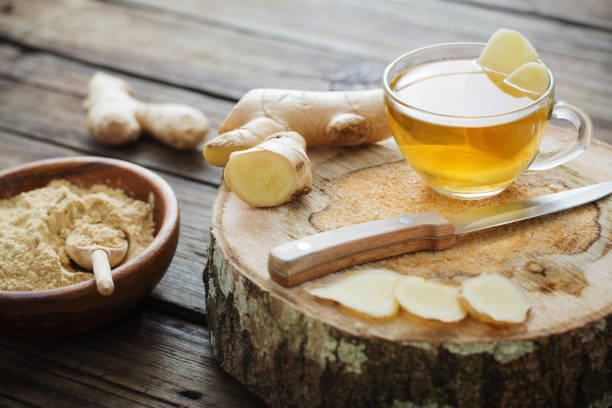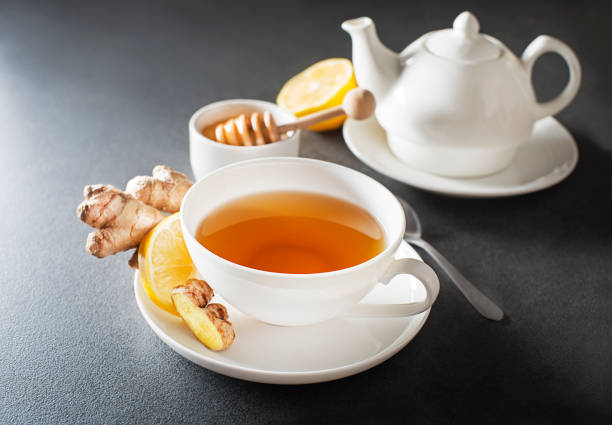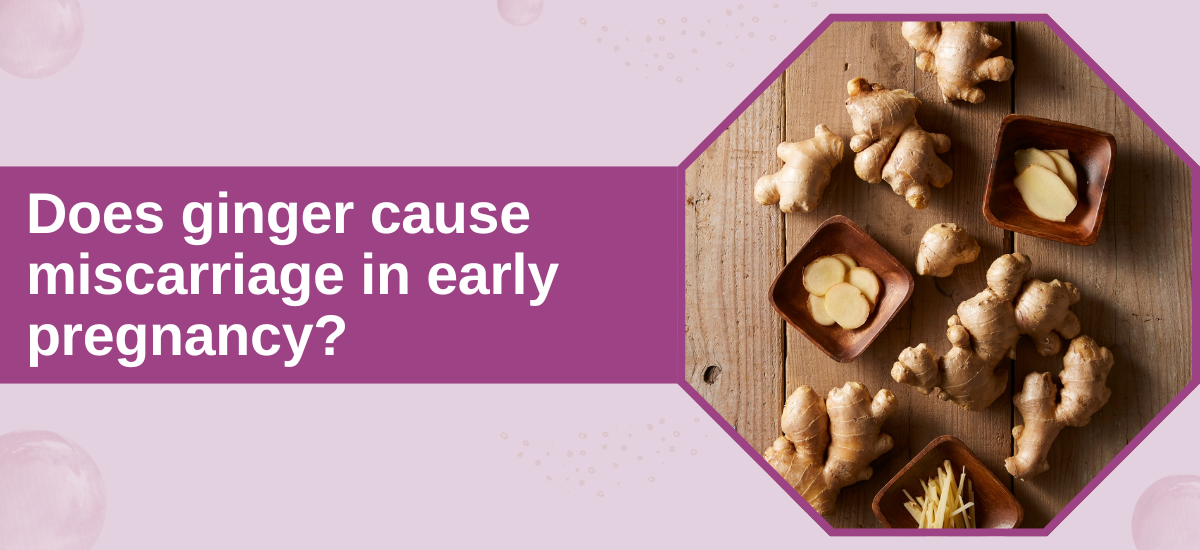- Have any questions?
- +91-98717 17305
- babiesandus12@gmail.com
Does Ginger Cause Miscarriage in Early Pregnancy?

IVF Babies disadvantages?
September 13, 2025
How to prevent fibroid growth
October 8, 2025
Miscarriage, especially in the early stages of pregnancy, is a heartbreaking and emotionally draining experience. It often leads parents to question every choice, from lifestyle habits to dietary preferences. While many factors contribute to early pregnancy loss—most commonly chromosomal abnormalities—food choices are frequently scrutinized. Among them, one natural remedy often questioned is ginger. With its strong flavor and therapeutic qualities, some expectant mothers wonder: Does ginger cause miscarriage in early pregnancy?
“Many myths surround miscarriage, and ginger is often unfairly blamed,” says Dr. Hrishikesh Pai, a leading IVF specialist in Mumbai and founder of Babies & Us IVF Center. “But it’s important to distinguish between anecdotal beliefs and what science and clinical experience actually reveal.”
At Babies & Us IVF Center in Mumbai, a team of fertility experts and OB-GYNs is dedicated to providing clear, evidence-based information to guide you safely through every stage of pregnancy. Backed by decades of experience and thousands of successful pregnancies, Dr. Hrishikesh Pai and his team ensure that each patient receives personalized and professional guidance on topics ranging from diet to safe natural remedies.
Can Eating Ginger Cause Miscarriage in Early Pregnancy?

Let’s clear the air with what research and science actually say.
The idea that ginger could trigger a miscarriage is one of the more persistent pregnancy myths, but there’s no strong scientific evidence to support this claim. In fact, several studies have evaluated the impact of ginger on pregnancy, particularly in relation to its effectiveness in reducing nausea and vomiting, which are common early pregnancy symptoms.
According to a 2018 meta-analysis published in the Nutrition Journal, ginger intake up to 1 gram per day was found to be safe and effective for managing early pregnancy nausea, without increasing the risk of miscarriage or other adverse outcomes.
Additionally, the World Health Organization (WHO) and American College of Obstetricians and Gynecologists (ACOG) both consider ginger to be safe in moderate amounts during pregnancy.
What about traditional beliefs?
In some cultures, ginger is considered a “hot” food and avoided during early pregnancy. However, these views are not supported by modern medical research.
Worried about what’s safe to eat during pregnancy? Connect with an expert to get personalized advice and ensure a healthy pregnancy journey.
Is Ginger Safe for Nausea and Vomiting During Pregnancy?

Let’s talk morning sickness – ginger’s claim to fame.
Morning sickness affects around 70-80% of pregnant individuals, especially during the first trimester. One of the most recommended natural remedies? Ginger tea for morning sickness.
Clinical studies support the use of ginger as a natural antiemetic — meaning it helps reduce nausea and vomiting. A randomized controlled trial published in the Obstetrics & Gynecology journal confirmed that women who took 1 gram of ginger daily for four days reported significantly less nausea and fewer vomiting episodes compared to those on a placebo.
Why does it work?
Ginger contains compounds like gingerol and shogaol, which help to relax gastrointestinal muscles and reduce nausea signals in the brain.
How Much Ginger Is Safe to Consume in Pregnancy?

Too much of a good thing? Here’s what you need to know.
Like all good things, moderation is key when consuming ginger during pregnancy. While ginger is generally safe, it’s recommended to limit intake to no more than 1 gram per day, divided into smaller doses.
Safe consumption examples:
- 1 cup of ginger tea (containing approx. 250 mg of ginger)
- Small ginger candies or lozenges
- A few slices of fresh ginger in warm water
Consuming high amounts (in excess of 4 grams a day) may induce mild side effects such as heartburn or indigestion or even changes in blood clotting — primarily for those with pre-existing concerns or on medication. Consumed in moderate amounts, ginger is a healthy and harmless complement to a pregnancy diet.
Does Ginger Affect the Baby’s Health?
What about your baby — does ginger affect fetal development?
Extensive clinical research verifies that ginger has no negative impact on fetal growth if consumed sparingly. There is neither an indication nor a correlation regarding the usage of ginger either concerning birth defects or low birth weight or developmental issues.
A comprehensive study published in Birth Defects Research followed pregnant women who consumed ginger and found no increase in adverse outcomes in their babies. In fact, by reducing severe nausea (hyperemesis gravidarum), ginger may indirectly support better maternal nutrition, which is critical for fetal health and growth in early pregnancy.
“A well-nourished mother often leads to a healthier baby. If ginger helps maintain nutrition by controlling nausea, it’s an ally — not a risk,” emphasizes Dr. Hrishikesh Pai.
What’s the Best Way to Include Ginger During Pregnancy?
Here’s how to safely enjoy ginger during your pregnancy journey.
You don’t need to eliminate ginger completely — but opt for safer, gentler preparations. These are a few easy and safe ways to add ginger:

Ginger Tea:
Quite possibly the most sought-after remedy! Just steep 1-2 pieces of fresh ginger in hot water for a few minutes. Ginger tea for morning sickness is a soothing and effective remedy.

Ginger Candies or Lozenges
Pre-measured and easy to carry, they’re great for on-the-go relief.
In Cooking:
Freshly grated ginger can be added to soups, curries, and stir-fry dishes for added flavor. Just be mindful of the total quantity used in a day.


Ginger Capsules (with caution)
Always consult your doctor before using ginger supplements, especially in concentrated capsule form.
Avoid heavily concentrated forms or essential oils, which may contain higher doses and pose unknown risks during pregnancy.
Conclusion
While it is perfectly normal to be concerned about getting everything right with your health and nutrition during pregnancy, be sure to only rely on science backed facts as well as expert recommendations. It is not only safe to consume ginger in moderate quantities but it is also a good complement to coping with early symptoms of pregnancy such as morning sickness and vomiting.
“As a fertility specialist, I often remind my patients that moderation and mindful choices matter more than fear-driven restrictions,” concludes Dr. Hrishikesh Pai. “Ginger, used wisely, is not a threat — it’s a helpful tool for many expectant mothers.”
Statistics also back up this reassurance: as much as 80% of expectant women experience morning sickness, and with ginger-users, more than 70% find relief with absolutely no problems. It’s an old remedy — not an Unsafe Food.
However, if you’re ever unsure, consult with your OB-GYN or a pregnancy nutrition expert. At Babies & Us IVF Center in Mumbai, we’re here to ensure you and your baby remain safe, healthy, and supported every step of the way.
FAQs
1. Is ginger tea safe in pregnancy?
Yes, ginger tea is usually safe during pregnancy if consumed in moderate amounts (up to 1 gram per day), and it has been proven to alleviate morning sickness as well as nausea.
2. Can ginger cause miscarriage in early pregnancy?
Not one bit of information available suggests ginger triggers miscarriage during early pregnancy if taken in moderate dosage.
3. Is it safe to have ginger tea for morning sickness every day?
Yes, moderate daily intake of ginger tea (up to 1 gram a day) is also safe among most expectant women and is effective in morning sickness.
4. Is ginger bad for my baby’s health?
Not at all, moderate ginger intake has been proven to have no impact on fetal development or cause birth defects. It is safe if taken only in recommended dosages.
5. Is ginger safe in the third and second trimesters?
Yes, ginger is allowable to take in moderate amounts in the second and third trimesters of pregnancy; we would advise consulting your doctor.
Reference links:
https://www.healthline.com/nutrition/ginger-tea-pregnancy
https://pmc.ncbi.nlm.nih.gov/articles/PMC5385053/
Disclaimer: The information shared in this content is for educational purposes and not for promotional use.




